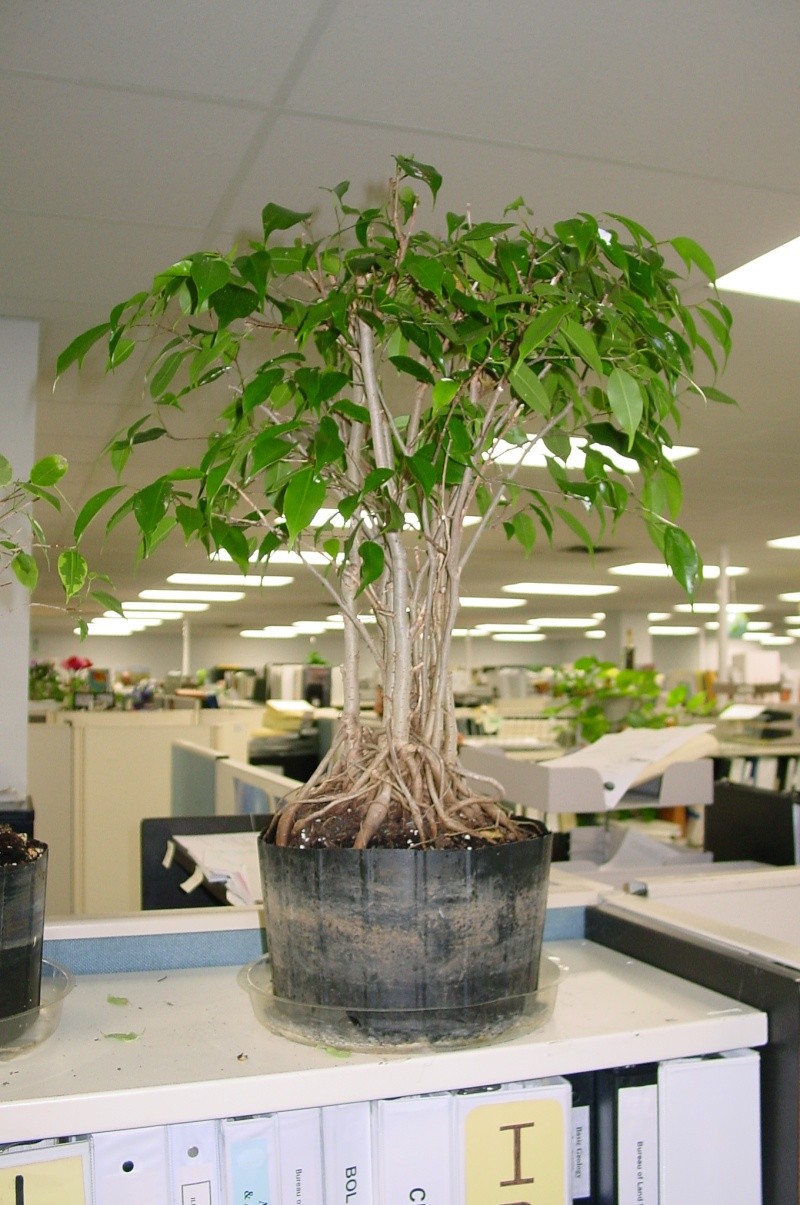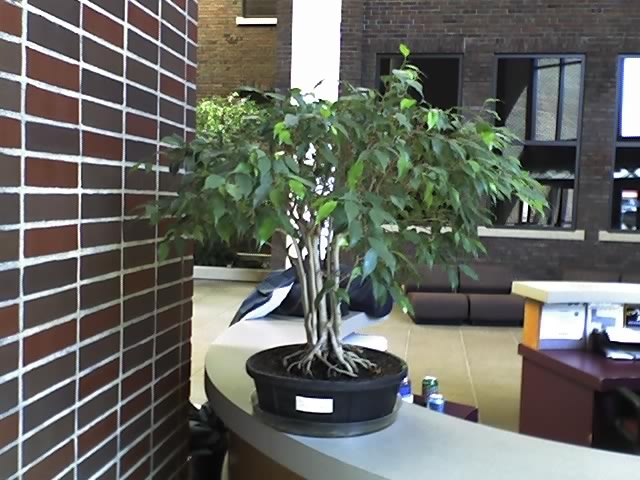Ficus nebari development
+7
jrodriguez
moyogijohn
Jay Gaydosh
Rob Kempinski
bonsaisr
leonardo
clint1982
11 posters
Page 1 of 2
Page 1 of 2 • 1, 2 
 Ficus nebari development
Ficus nebari development
G'day everyone, Im Clint from Australia. i recently acquired three small port jackson figs.[ficus rubiginosa] Just wondering if anyone has any tips or techniques on nebari devlopment I could use. Thanks
clint1982- Member
 Re: Ficus nebari development
Re: Ficus nebari development
If you ever get to Sydney mate look up Bonsai South, Leong Kwong is a ficus expert Clint.
ciao...Leonardo
ciao...Leonardo
leonardo- Member
 Ficus Nebari Development
Ficus Nebari Development
I just acquired an otherwise very nice tiger bark fig that lacks nebari. It has already been potted, so this is for future development.
I am on the other side of the Globe from Sydney, so any information here would be welcome.
Iris
I am on the other side of the Globe from Sydney, so any information here would be welcome.
Iris

bonsaisr- Member
 Re: Ficus nebari development
Re: Ficus nebari development
I like to fire up all the boilers for max speed when growing for trunk size.
No clippers allowed on deck.
I use lots of perlite products and sizes for total control of the ship.
We sail in warm climates and big oceans for optimum growth potential.
Feed that boiler with all the food she can handle.
And may the bonsai gods be with you.
ciao.....Leonardo
No clippers allowed on deck.
I use lots of perlite products and sizes for total control of the ship.
We sail in warm climates and big oceans for optimum growth potential.
Feed that boiler with all the food she can handle.
And may the bonsai gods be with you.
ciao.....Leonardo
leonardo- Member
 Ficus Nebari Development
Ficus Nebari Development
I don't think we are talking about the same thing. I have no problem with the trunk size. It has a caliper of about 4 cm at the base. Nebari are the surface roots around the trunk. That is what this tree is lacking.
Iris
Iris

bonsaisr- Member
 Re: Ficus nebari development
Re: Ficus nebari development
Thanks Leonardo, I checked out the bonsai south web site very impressive, will have to check it out next time im in sydney. I do have to agree with bonsaisr though I was wondering about the surface roots. Do you think by letting the tree grow fast as you said with the trunk the surface roots will develope more?
clint1982- Member
 Re: Ficus nebari development
Re: Ficus nebari development
Trees try to grow like a tooth molar. So with ficus we cut the molar roots off, a derootation if you will if there was a word. Then you grow the spoke surface roots to make up for lower root formation removed. The younger the plant you start with, the better results as you could well imagine.
ciao.....Leonardo
ciao.....Leonardo
leonardo- Member
 Re: Ficus nebari development
Re: Ficus nebari development
Most Ficus will make a tuber-type root - like a fat potato eventually. So when the tuber develops you have to be ruthless and cut back and carve it. New roots will sprout at teh cut sites.
Ground layering works, so does root grafting. So does trimming all the bottom roots off the tree (cut it flat across with a saw), place it on a tile so the new roots have to grow outward and mound the soil around the future nebari site. I actually demonstrated the saw cutting in my book. Ficus are tough trees and can take this treatment - I wouldn't try it on all trees.
Ground layering works, so does root grafting. So does trimming all the bottom roots off the tree (cut it flat across with a saw), place it on a tile so the new roots have to grow outward and mound the soil around the future nebari site. I actually demonstrated the saw cutting in my book. Ficus are tough trees and can take this treatment - I wouldn't try it on all trees.

Rob Kempinski- Member
 Ficus Nebari Development
Ficus Nebari Development
Thank you. Although the tree is ten years old, it is new to me, and I think I pruned the roots drastically enough for now. I will repot it next year & see if I can encourage a new set of roots.
I have been meaning to ask you, why is your avatar a lawn sprinkler? One might think that your chief function in life is to run in circles, spouting in all directions. Doesn't sound like you.
You may have met my friend Jackie Kinney. She goes to Melbourne in the winter and has been to your club.
Iris
I have been meaning to ask you, why is your avatar a lawn sprinkler? One might think that your chief function in life is to run in circles, spouting in all directions. Doesn't sound like you.
You may have met my friend Jackie Kinney. She goes to Melbourne in the winter and has been to your club.
Iris

bonsaisr- Member
 Re: Ficus nebari development
Re: Ficus nebari development
On all the Ficus I have I allow the plant to grow as it will. I develop the nebari by cutting off the walls of the growing pot to expose the roots, as I go further down the pot the web of roots begins to develop.
Below is a photo of one of my better "office plant/bonsai reduction" projects and the resulting nebari. (The original soil line was just above the top of the root mass.)
forbey

Below is a photo of one of my better "office plant/bonsai reduction" projects and the resulting nebari. (The original soil line was just above the top of the root mass.)
forbey


Jay Gaydosh- Member
 Re: Ficus nebari development
Re: Ficus nebari development
Thanks for all the tips I guess I will try a different technique on each of my figs see which works best.
clint1982- Member
 Re: Ficus nebari development
Re: Ficus nebari development
clint1982 wrote:Thanks for all the tips I guess I will try a different technique on each of my figs see which works best.
Take a look at the posting I made on the bonsai forum called "Kracken Update." I used three nebari improvement techniques on that tree. Chopping the right hand root, grafting the middle root and ground layering the left hand side. (You may have to go to my blog to see the blow up photos of the roots.)

Rob Kempinski- Member
 ficus rooting
ficus rooting
Rob,iwant to know what feeds the tree when you saw the root system off??? is this a spring time thing to do where the tree can be outside..thanks john
moyogijohn- Member
 Re: Ficus nebari development
Re: Ficus nebari development
moyogijohn wrote:Rob,iwant to know what feeds the tree when you saw the root system off??? is this a spring time thing to do where the tree can be outside..thanks john
Good question. The tree can live off its stored sugar/nutrients and wastes no time making new roots. In a week or two it has the beginning of new roots feeding it. It in essence is a large cutting.

Rob Kempinski- Member
 Re: Ficus nebari development
Re: Ficus nebari development
I think you are better off putting this in a tall Mexican pot and making an office plant. Either that or it will need serious work to ever be a decent bonsai and in your climate unlikely.Jay Gaydosh wrote:On all the Ficus I have I allow the plant to grow as it will. I develop the nebari by cutting off the walls of the growing pot to expose the roots, as I go further down the pot the web of roots begins to develop.
Below is a photo of one of my better "office plant/bonsai reduction" projects and the resulting nebari. (The original soil line was just above the top of the root mass.)
forbey

Rob Kempinski- Member
 Re: Ficus nebari development
Re: Ficus nebari development
John,
The techniques mentioned by Rob are roght on point. To develop a good root system, you might want to learn a little bit about the ecological conditions of ficus, lets see:
When ficus grow in open planes, they the crown tend to be quite broad, almost 7 to 10 times larger when compared to the trunk. In hilly areas, the tree tends to grow tall, with many roots growing downward. Depending on the mage you want to portray, distinct approaches must be applied.
Since you are inquiring about the development of nebari, you might one to know about some of the classifications involved in ficus roots. Ficus have bar or board type roots, tuber roots and fine beard-like roots. The optimal nebari on a ficus is one the displays a blend of all of these. In Taiwan ficus nebari is developed by increasing the humidity on the trunk and basal structure of the tree. In areas where the roots are tubular and grow downward, the tuber-potato like look is eliminated by making vertical incisions. From these incisions, hundreds of hair roots develop. Once they are mature, they are roped and held close to the trunk of the tree with the aid of wire. When they mature, they will blend with the trunk, thus creating a muscular well developed nebari.
Kind regards,
Jose Luis
The techniques mentioned by Rob are roght on point. To develop a good root system, you might want to learn a little bit about the ecological conditions of ficus, lets see:
When ficus grow in open planes, they the crown tend to be quite broad, almost 7 to 10 times larger when compared to the trunk. In hilly areas, the tree tends to grow tall, with many roots growing downward. Depending on the mage you want to portray, distinct approaches must be applied.
Since you are inquiring about the development of nebari, you might one to know about some of the classifications involved in ficus roots. Ficus have bar or board type roots, tuber roots and fine beard-like roots. The optimal nebari on a ficus is one the displays a blend of all of these. In Taiwan ficus nebari is developed by increasing the humidity on the trunk and basal structure of the tree. In areas where the roots are tubular and grow downward, the tuber-potato like look is eliminated by making vertical incisions. From these incisions, hundreds of hair roots develop. Once they are mature, they are roped and held close to the trunk of the tree with the aid of wire. When they mature, they will blend with the trunk, thus creating a muscular well developed nebari.
Kind regards,
Jose Luis

jrodriguez- Member
 Ficus Nebari Development
Ficus Nebari Development
Never mind the nebari. After I repotted my tiger bark fig in an 8-inch pot, it dropped most of its leaves. Should I have defoliated it before repotting? I have it in mostly shade. I am afraid to cut it back before it shows signs of growth. I am giving it a rooting hormone treatment, KLN. What should I do now? A picture will follow when I get to it.
Iris
Iris

bonsaisr- Member
 Re: Ficus nebari development
Re: Ficus nebari development
Iris,
To accurately answer your inquiry, I need for you to answer several questions, lets se:
1) Where do you live?
2) What type of sustrate did you use?
3) How many roots did you cut?
4) If you did cut roots, did you water the tree immediately afterwards?
5) Wher is the tree located?
6) Does the tree get enough sun?
7) Did the color of the leaves turn from green to yellow or did they just fall?
Kind regards,
Jose Luis
To accurately answer your inquiry, I need for you to answer several questions, lets se:
1) Where do you live?
2) What type of sustrate did you use?
3) How many roots did you cut?
4) If you did cut roots, did you water the tree immediately afterwards?
5) Wher is the tree located?
6) Does the tree get enough sun?
7) Did the color of the leaves turn from green to yellow or did they just fall?
Kind regards,
Jose Luis

jrodriguez- Member
 Re: Ficus nebari development
Re: Ficus nebari development
jrodriguez wrote:John,
From these incisions, hundreds of hair roots develop. Once they are mature, they are roped and held close to the trunk of the tree with the aid of wire. When they mature, they will blend with the trunk, thus creating a muscular well developed nebari.
Jose Luis
Jose Luis,
I'm in the process of doing this now with several of my ficus. How do you wire the aerial roots against the trunk without marring the roots?
Thanks,
Ed

EdMerc- Member
 Re: Ficus nebari development
Re: Ficus nebari development
 [/quote]
[/quote]I think you are better off putting this in a tall Mexican pot and making an office plant. Either that or it will need serious work to ever be a decent bonsai and in your climate unlikely.[/quote]
Rob,
The photo I included above was submitted as a photo example of how I develop Ficus nebari. It's a plant in the process of having it's root mass exposed and hardened off. The canopy has recovered from the initial chopping and it has been transplanted to a bonsai pot for a co-worker. It has been outside all summer and I've been told it is doing very well. I'm still waiting for photos.
I appreciate your opinion; however, I have had 4 of them (one of which is on display in the Illinois EPA, the one with my a co-worker. The remaining two are at home in the works). They all started out as 5 to 7 foot office plants and have been cut back to 12 to 18 inches. The one above should have been cut back 5 or 6 inches more, but it's doing well. The canopies have recovered nicely, the nebari on all 4 look great and are developing aerial roots and the ones on display receive copious compliments. Plus, I like them this way more than I do as office plants. I will probably continue to collect and work with these plants.
The three that I remain in control of, periodically have their trunks tightly wrapped in shrinkwrap to pull the trunks into contact with the others with the hopes of getting some or all of the trunks to fuse into massive trunks.
While this project seems odd to some, the Ficus is forgiving enough to allow me to experiment without doing major damage (and if they die) I got them really cheap! So, I can change my mind about what I do with them without fear of loosing a major piece of work.
Jay

Jay Gaydosh- Member
 Re: Ficus nebari development
Re: Ficus nebari development
Jay,
Your tree is really not good material. Nebari development in a ficus is an artform. The disorderly appearance of the roots (similar to cooked pasta) will never achieve a quality look. I think Rob was just pointing out that there is better material out there and that it will be a lot more rewarding to begin with a tree that has appealing potential.
Ed,
Send me a PM with your address. I co-wrote an article with my teacher Cheng Cheng Kung on the development of ficus roots. I will try to send it to you.
Kind regards,
Jose Luis
Your tree is really not good material. Nebari development in a ficus is an artform. The disorderly appearance of the roots (similar to cooked pasta) will never achieve a quality look. I think Rob was just pointing out that there is better material out there and that it will be a lot more rewarding to begin with a tree that has appealing potential.
Ed,
Send me a PM with your address. I co-wrote an article with my teacher Cheng Cheng Kung on the development of ficus roots. I will try to send it to you.
Kind regards,
Jose Luis

jrodriguez- Member
 Re: Ficus nebari development
Re: Ficus nebari development
As a side note: I am periodically wrapping the trunks in shrinkwrap and leaving to attempt to get the trunks to fuze.
You did say that developing Ficus nebari is an artform. Art is subjective, not objective and as such, I can appreciate your dislike of my trees, hopefully, you can appreciate that I disagree with you.
Jay
You did say that developing Ficus nebari is an artform. Art is subjective, not objective and as such, I can appreciate your dislike of my trees, hopefully, you can appreciate that I disagree with you.
Jay

Jay Gaydosh- Member
 Re: Ficus nebari development
Re: Ficus nebari development
Hi Jay, I am not being mean. I am trying to pass on some advice that I have learned the hard way.
First, zone envy is a difficult thing to over come. By that I mean growing trees outside their natural zone is very difficult. I know many people grow tropical trees in temperate zones so that they have something to do in the winter. However, unless one is going to make a major commitment to growing tropical trees, they will never really thrive in temperate zones. And even with expensive lights, large fuel bills to keep the trees warm, and attention to bugs and mildew/fungus they just sort of exist. Since bonsai entails placing human's will on a plant to make a design, the best designs will require the tree to thrive and respond vigorously to the work of the artist. Hence grow trees that thrive in your zone.
Second the best bonsai start with the best material. Assuming you can't get over zone envy, then work with material that will make a difference as a bonsai. As far as bonsai material goes, Ficus Benjaminna is far down the scale of adaptability to bonsai. It has large leaves, does not respond well to pruning, long internodes, and is subject to a host of insects and fungi. With great growing conditions it can be made into a nice bonsai, but it really needs tropical conditions and needs to be a very large bonsai (hard to grow indoors due to space limitations.) For examples look at Southeast Asia - many nice big ones in Thailand.
If I were to grow a Ficus indoors I would first opt for Ficus Salicaria, then Ficus microcarpa Nitida, Kinmen, and then Green Island. The rest I wouldn't even attempt (in fact I don't even attempt the rest in Florida with one exception for a very large Ficus Benjamina I started before I knew any better and is now in our zoo exhibit.)
Finally when sharing ideas its good to be open to discussion. That's how I learn and hopefully you will too. Frankly the nebari on the Ficus B. trees you show is pretty poor. Whatever techniques you are using are not working very well even considering the zone handicap you have placed on yourself. Jose has some great techniques he learned from the masters in Puerto Rico and Taiwan. I learned mine from the Florida masters. Also growing the multi-trunk styles is not a very good idea. The skinny trees will always look juvenile. Sure if you grew these in the ground for 5 years in a tropical zone the trunks will merge but indoor culture you are looking at lots of work and time. Hence why bother? Put that effort into a Trident maple and get a much better tree in the same period.
First, zone envy is a difficult thing to over come. By that I mean growing trees outside their natural zone is very difficult. I know many people grow tropical trees in temperate zones so that they have something to do in the winter. However, unless one is going to make a major commitment to growing tropical trees, they will never really thrive in temperate zones. And even with expensive lights, large fuel bills to keep the trees warm, and attention to bugs and mildew/fungus they just sort of exist. Since bonsai entails placing human's will on a plant to make a design, the best designs will require the tree to thrive and respond vigorously to the work of the artist. Hence grow trees that thrive in your zone.
Second the best bonsai start with the best material. Assuming you can't get over zone envy, then work with material that will make a difference as a bonsai. As far as bonsai material goes, Ficus Benjaminna is far down the scale of adaptability to bonsai. It has large leaves, does not respond well to pruning, long internodes, and is subject to a host of insects and fungi. With great growing conditions it can be made into a nice bonsai, but it really needs tropical conditions and needs to be a very large bonsai (hard to grow indoors due to space limitations.) For examples look at Southeast Asia - many nice big ones in Thailand.
If I were to grow a Ficus indoors I would first opt for Ficus Salicaria, then Ficus microcarpa Nitida, Kinmen, and then Green Island. The rest I wouldn't even attempt (in fact I don't even attempt the rest in Florida with one exception for a very large Ficus Benjamina I started before I knew any better and is now in our zoo exhibit.)
Finally when sharing ideas its good to be open to discussion. That's how I learn and hopefully you will too. Frankly the nebari on the Ficus B. trees you show is pretty poor. Whatever techniques you are using are not working very well even considering the zone handicap you have placed on yourself. Jose has some great techniques he learned from the masters in Puerto Rico and Taiwan. I learned mine from the Florida masters. Also growing the multi-trunk styles is not a very good idea. The skinny trees will always look juvenile. Sure if you grew these in the ground for 5 years in a tropical zone the trunks will merge but indoor culture you are looking at lots of work and time. Hence why bother? Put that effort into a Trident maple and get a much better tree in the same period.

Rob Kempinski- Member
 Ficus Nebari Development
Ficus Nebari Development
1 Central NY, as you can see from my profile, USDA Zone 5, 43rd Parallel.jrodriguez wrote:Iris,
To accurately answer your inquiry, I need for you to answer several questions, lets se:
1) Where do you live?
2) What type of sustrate did you use?
3) How many roots did you cut?
4) If you did cut roots, did you water the tree immediately afterwards?
5) Wher is the tree located?
6) Does the tree get enough sun?
7) Did the color of the leaves turn from green to yellow or did they just fall?
Kind regards,
Jose Luis
2 A layer of coarse bonsai soil on the bottom, the rest regular mix. Formula in the thread Preparing to Repot.
3 Didn't count them. The tree went from an 8 inch bulb pan to an oblong 8 inch bonsai pot, so I cut a lot.
4 Of course
5 For about 10 days it was outdoors in the shade. It is now out on my bonsai table in the sun.
6 Of course. I hope not too much.
7 Most of them just abscissed without any color change. When touched, they fell off. There are still a few leaves at the ends of branches. I don't think it is losing any more, but I don't see any definite signs of growth yet. It needs to be chopped back.
Iris


bonsaisr- Member
Page 1 of 2 • 1, 2 
 Similar topics
Similar topics» Nebari? Where to from here?
» ficus development
» Ficus, first development
» Ficus Branch Development
» Nebari first or branches and Nebari work simultaneously ?
» ficus development
» Ficus, first development
» Ficus Branch Development
» Nebari first or branches and Nebari work simultaneously ?
Page 1 of 2
Permissions in this forum:
You cannot reply to topics in this forum







